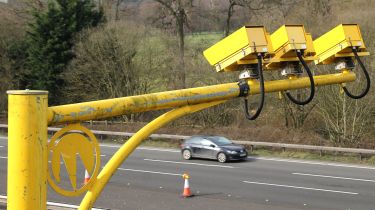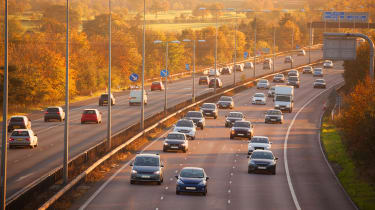Average speed cameras: how do they work?
Average speed cameras are found across many A roads, motorways and road work areas – here’s what you need to know

As modern cars get faster and more powerful, and our roads become more congested, average speed cameras are becoming increasingly common. They operate differently from traditional speed cameras, so understanding how they work can help you follow the speed limit and avoid receiving a fixed penalty notice.
While it's beneficial to know how speed cameras work, it’s vital to understand the importance of following the speed limit. With the potential to get up to high speeds more easily, it’s more important than ever to pay attention to the prevailing speed limit for your safety, and that of other road users.
 Speeding fines UK 2024: how much will I have to pay?
Speeding fines UK 2024: how much will I have to pay?
Average speed check technology also helps maintain traffic flow; steady speeds are proven to reduce congestion, and therefore have the potential to make our roads much safer. But how do they work, and where might you find them?
What is an average speed camera?
As the name suggests, average speed cameras record your average speed over a certain distance. In contrast, traditional fixed Gatso-style cameras record a snapshot of your speed at one point in time. The latter tend to be placed in locations where dropping drivers’ speed is especially important, such as outside schools and at accident hotspots. However, once a driver has passed the camera, there’s nothing to stop them from exceeding the speed limit.
Average speed cameras are arguably more effective at enforcing speed limits. An initial camera records your car’s registration plate, followed by another camera further down a stretch of road. The time taken for your car to pass between the two cameras is recorded and a computer calculates your average speed between them.
Once you have passed the first camera, there really is no escape – you have no choice but to comply with the speed limit in these areas or risk getting caught breaking the law. Doing so will incur a fine and penalty points on your licence, or see you having to attend a speed awareness course.
 Speed awareness course: cost, who’s eligible, and how long does it take?
Speed awareness course: cost, who’s eligible, and how long does it take?
While a car must pass a second camera for its average speed to be calculated, there’s no limit to how long the average speed zone can last. In a sequence of multiple cameras, it is at the discretion of the local enforcement agency as to whether cameras work in pairs or in larger groups.
Where can you find average speed cameras?
Officially, average speed cameras are located wherever traffic speed has been identified as raising safety concerns. Common locations are along busy stretches of A-road, be they single or dual-carriageways, and temporarily in roadworks zones, especially on motorways.

You may also find average speed cameras located at either end of a road running through a village, in order to reduce the number of drivers speeding through a residential area. These are usually prominently positioned with advanced warnings and are highly likely to show on speed camera locator apps.
Variable speed limits do not typically use average speed cameras – 'smart motorways' such as sections of the M25, M6 and M62 instead use fixed-point cameras named Hadecs 3. They operate whenever a temporary speed limit restriction sign is illuminated, but can also be used to enforce the national 70mph motorway speed limit.
Are all average speed cameras the same?
There are two commonly used average speed camera systems and they work in fundamentally the same way. SPECS cameras are usually mounted on roadside gantries at regular intervals of more than 200 metres, although the latest SPECS 3 cameras can be as little as 75 metres apart. They appear similar to security surveillance cameras, such as those found in urban public areas, and are mounted in yellow plastic housings. They're effective day and night, with infrared illumination sufficient to clearly capture number plates once it gets dark.
Newer VECTOR cameras look similar but are more versatile – as well as speed limits, they can record driving offences committed at bus lanes, level crossings and traffic lights, and enforce congestion-charging schemes. They can be mounted on their own gantries or attached to streetlamps or other tall urban street furniture. They can be either forward or rearward facing and one camera can monitor two lanes of traffic.
Both camera types incorporate automatic number plate recognition (ANPR), which allows an offending car to be identified and linked to its registered keeper.
Will I know if I've been recorded by a camera?
If you have passed an average speed camera, you will have been recorded by it. Only by ensuring that your average speed is below the legal limit can you ensure that a prosecution notice won't land on your doormat.
Whereas static single-point cameras use a powerful ‘double flash’ to illuminate car number plates when an offence is committed, SPECS and VECTOR cameras use invisible infrared illumination in failing light; there are few weather conditions that render number plates impossible to capture.
Is there an average speed camera tolerance?
It’s a myth that speed cameras allow a 10% plus 2mph leeway when driving over the speed limit. While the National Police Chiefs’ Council (NPCC) recommends this buffer, it’s up to each operator’s discretion as to whether they allow any leeway at all. Legally you could get a ticket for going even 1mph over the speed limit.
Exceeding the speed limit is against the law and a network of average-speed cameras that measures the time it takes a car to complete a set journey will provide all evidence required to secure a speeding conviction.
However, not every instance of the speed limit being exceeded results in prosecution. Individual police forces reserve the right to exercise discretion in determining whether further action is appropriate. There's no hard and fast rule, though, and there might be times when a zero-tolerance policy applies. Similarly, drivers may be prosecuted in different ways, depending on the offence and their history. In some cases, for example, they may be offered the opportunity to attend a speed awareness course in place of receiving points on their licence.
It's very unlikely that an appeal based on mitigating circumstances will quash a prosecution. It's always up to the motorist to drive safely and at an appropriate speed. Any instance of speeding might be seen as the result of a decision made by the driver and could even be treated as reckless or dangerous driving as well as simply speeding.
Frequently Asked Questions
Improve your driving and knowledge with our helpful guides
Most Popular

Best car leasing deals 2025: this week’s top PCH offers

Cupra Terramar review – sporty yet sensible family SUV

The Audi TT might not be dead after all as bosses weigh up EV comeback
Tips & advice

Car dashboard warning lights: what does each symbol mean?

Electric car charging stations: public networks, charger types, apps and maps






